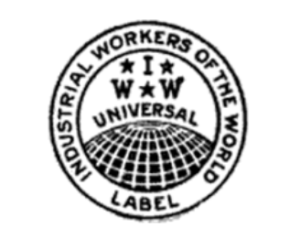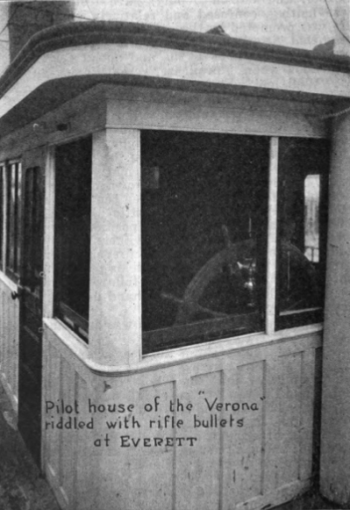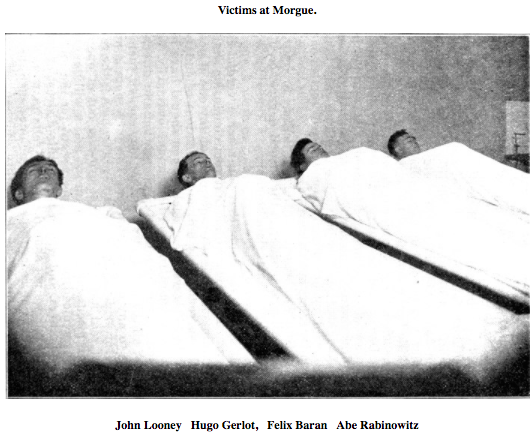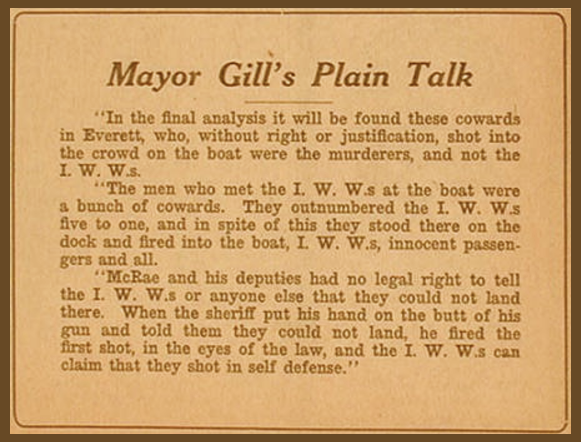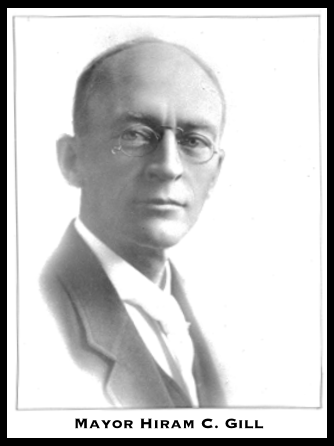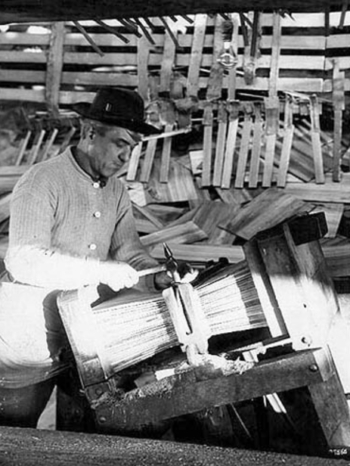Song on his lips, he came;
Song on his lips, he went;—
This be the token we bear of him,—
Soldier of Discontent!
-Charles Ashleigh
Hellraisers Journal, Tuesday November 14, 1916
Everett’s Bloody Sunday: Making Facts Known in Interest of Justice
From the Seattle Union Record of November 11, 1916:
I. W. W. NOT TO BLAME FOR FIGHT
—–Prominent Attorney Investigating Case Believes
“Citizens Committee” Is Entirely at Fault
in Everett Affair
—–By THOMAS R. HORNER
So many untruthful statements have been published concerning the I. W. W. trouble last Sunday [November 5th], at Everett, that in the interest of justice the facts should be made known, and when the facts are known the public will see that the blame of the trouble rests wholly on the “Citizen’s Committee,” organized by the mill owners to put down by force and bloodshed the Shingle Weavers and Longshoremen’s strike at that place.
The I. W. W. did not go armed to Everett. They were admonished by their leaders to go unarmed. There may have been a very few who had weapons, but the vast number were without them. This statement is proved by a circumstance that cannot successfully be denied:
When the shooting occurred the boat had just been tied to the dock alongside, and about twenty feet from the broad side of the warehouse. There is unanswerable proof there were at least three parties of deputies entrenched so as to be comparatively safe themselves, yet so they could rake the boat from three angles.
Only Few Bullets From Boat
It is plain that practically all the shots that were fired from the direction of the boat must have struck the warehouse; yet the warehouse shows that only a very few bullets came from that direction. But the riddled condition of the boat shows that the vigilantes fired hundreds of times. Moreover, the splintered sides of the warehouse show that a number of shots were fired blindly from the inside of the north warehouse, where some of the vigilantes were ambushed, thus giving good grounds for the belief that when the trouble started they became panic-stricken and began madly to fire through the board sides, and possibly wounding their own men. At the same time they were firing blindly into a regular passenger steamboat without even distinguishing between “the dreaded” I. W. W.’s and the other passengers and members of the crew who were on board the Verona.
The other alternative possible is that they fired premeditatively into a regular passenger boat from ambush getting the range from a board which had been previously knocked off the side of the warehouse. New nails have been used in replacing this board.
Several hundred armed vigilantes, with a machine gun, as I am told, went to the dock to prevent, as they contend, the landing of the boat’s passengers; but that their real purpose was to kill the unarmed men on the boat is proved by the fact that no warning was sent to the boat not to land, although they had been informed of its coming; instead they cunningly waited until it was tied securely at the dock and then began their deadly work. In their lust for blood of the I.W. W.’s they didn’t even stop to distinguish between the passengers on board. The first shot came from the sheriff and his armed gang-that will be proved.
Another posse of entrenched men with high power rifles, left mute evidence of wild shooting, which might easily have hit their own men.
“Citizens Committee” Alternatives
When all the facts are known the Citizens committee and the posse they organized can take their choice between pleading to manslaughter because of criminal stupidity and incompetence or to murder in the first degree, because of criminal conspiracy to murder in cold blood unarmed men, on a regular passenger boat in American waters.
The public has been kept in darkness about the unspeakable cruelty of the Everett officials and “Citizens Committee” in this strike. Colorado and Michigan never surpassed the outrages that have been perpetuated on unarmed men in that town and the officials either wink at it or openly approve it.
A few days ago (October 30th) forty-one unarmed men were seized, taken to Beverly Park, beaten up, bones broken, and then were rushed over the sharp blades of a railway cattle guard, smearing it with blood to an extent that was revolting. Sixteen were taken to the hospital and all of them were badly injured. This is but one of the many outrages that have been committed and which the press will not publish.
The Everett officials, grossly partial to the mill owners, state that prosecutions are to follow. We welcome an opportunity to show the public where the blame in this matter belongs.
———-
[Photograph added.]
Two Passengers Tell Their Stories:
STORIES OF PASSENGERS
—–OSCAR CARLSON, A WOUNDED PASSENGER,
MAKES STATEMENT
—–
Oscar Carlson was a regular passenger on the Verona and has lived in Seattle for the last six years except for parts of three years in Victoria, B. C. He works on construction work for Grant, Smith & Co. He and his partner got tickets for the Verona and went on board, not realizing how many I. W. W.’s there were. He saw no guns displayed on the voyage up and heard no threats of any kind. As the boat approached the dock he was up in front of the cabin as is usual in landing-he couldn’t say for sure but thought the first shot was from the dock.
“On which side of you would you think-” (Here hospital orderlies came to wheel him to an X-ray room, and it was about an hour before he could be seen again.) He was terribly wounded, but is making a game fight for life. According to Dr. Ross he was shot in the arm which resulted in a compound fracture with one bullet still in the arm; he was shot once in the small of the back, three times in the abdomen and once in the thigh, besides being injured on the head which is all bandaged up.
Resuming his story, he said:
Coming up, the I. W. W.’s sung some, and also before landing.
He heard someone on the dock say, “Go back, you can’t land here.” He thought someone on dock close to the boat seemed to fire-first in front, then three or four more from the dock. Then everyone was shooting. He was wounded crawled inside upper cabin and after all was over, I. W. W.’s opened up his coat. There were no doctors on board.
I never expected to have any shooting, all I heard was “They may not let us land.” I didn’t hear any threat of violence-it seemed so funny. I was not acquainted and knew but two by sight only.
He did not see any guns and thinks only a few were on the Verona. Suddenly he roused himself and said:
I tell you as it comes to me now, it seems one shot came from the dock first then three or four from the other side, then all at once, but I don’t know. If we had known so many I. W. W.’s were going, we would have gone on the interurban.
“Did any one on the boat fire first, from behind or below you?”
“I do not think so,” said Carlson.
“If they had would you have heard it?”
“I should think I would have,” answered Carlson.
Carlson is naturally very weak from his many wounds and talking is very difficult. His shattered arm with the bullet still in it, gives him the most pain. All the nurses and hospital doctors speak in high terms of his splendid fortitude, patient, endurance, high character and marvelous physique.
The doctors have hopes of his ultimate recovery, but to be on the safe side an application has been made to the Snohomish County courts to have his deposition taken, and for fear of delay his story will be put in form of an affidavit.
—–
STATEMENT OF ERNEST NORDSTROM,
A PASSENGER
—–Ernest Nordstrom, who resides at the West Hotel and is employed in the construction of the new Fischer building, said:
We had our tickets bought and got in line with the crowd to go on board when some one asked us if we had a card. We said “No,” then he said, “if you have no card you can’t march in this line.” That was the first we knew the I. W. W.’s were going.
I don’t know much, for being short, I couldn’t see-Carlson was ahead of me. We were thinking of getting off the boat as usual. We had no idea there would be any trouble or we never would have been up in front-we would not have made targets of ourselves. We saw no guns on the Verona on the way up and heard no threats-they didn’t do much talking to us-perhaps the others, knowing we were strangers were careful. But I have made lots of trips on these boats and I have seen lots of rougher looking men-I saw no booze.
Carlson was up in front on forward deck and as we got up to the dock someone said, “You fellows can’t come ashore.” “We can,” replied several voices on the boat, or something like that. I couldn’t swear to where the first shot came from, but as it comes to me I thought the first shot was a warning not to go ashore. After that there were shots-gee whiz-all kinds of shots, and when they commenced all ran to the other side and the boat began to tip. I went to the same side but crawled up to the center of the boat, so as not to fall underneath if the boat tipped over. I was lying head down.
While lying in a heap I heard two splashes of men overboard. I was thinking if the shooting kept on I would try to drop overboard. I lifted up my head and saw Carlson-I knew him by his overcoat-hit in the head, he tried to rise, then I think he was hit in the stomach and he dropped again. I heard a voice on the boat say, “Take your boat away,” and I called it too. Oh, it seemed so long before she got away-awful!
In a calm voice yet with a note of righteous indignation he continued,
I am sure there is no excuse for this whatever-there need have been no bloodshed.
When asked if there had been any threats of reprisals on the way back, he answered:
No threats of any kind; I heard only warnings called to the steamer Calista, and how many dead and wounded on board the Verona.
———-
[Photograph added.]
Let every lover of justice help to reverse the lies.
PERTINENT QUESTIONS PEOPLE WANT ANSWERED
—–
Why is it that the crowds of Everett citizens who come to view the dock apparently get the impression in their minds that the so-called “citizens'” posse violated every canon of common sense-if their real purpose had been to prevent bloodshed and disorder?
Why is it that 75 per cent of the citizens of the so invaded city do not condemn the invaders as much as they do their self-constituted defenders?
Why is it that the published reports talk so much of invaders firing into innocent citizen spectators on the docks, and say so little about innocent passengers-not members of the I. W. W.-who were on the death-ship?
Why is it the sworn evidence now coming in flatly contradicts the first reported testimony of the same people?
Why is it that the ordinary laws of journalism have been violated by every daily paper in Seattle?
Have you, Mr. and Mrs. American Citizen, read any report of the tragedy as given by well known Seattle men-not I. W. W.s-who were not passengers on the steamer Verona?
Have you seen any photograph published of Oscar Carlson, who was a passenger on an American vessel, which was fired on without warning? Have you read his story? Why not? You will see his full story for the first time in this paper! ! ! Also another passenger’s story at first hand.
Are both daily papers of Everett owned and controlled by the same influences in control in Everett?
Are the papers of Seattle following the same lead?
Would this explain why the first page of Thursday’s Post-Intelligencer says “Captain Wyman, of the steamer Verona, went with the Everett authorities to identify the alleged gunmen, and reiterated his earlier statement to the effect that the opening volley was fired from the boat?” In the same issue of another column, in reporting the testimony of Captain Wyman, when he was under oath before the United States steamboat inspectors, “he could not tell whether the first shot came from the boat or not.”
On Sunday night there was a story in circulation in Everett that after the massacre an ordinary citizen who had slipped into the prohibited area overheard a group of panicky citizen-deputies say: “We must stick together on this story, about the first shot from the boat.” This never appeared in any newspaper.
At the proper time other published statements will be reversed. In the meantime let every lover of justice prepare to spread the antidote to all this poisoning. Get extra copies of the Record and circulate them among your acquaintances. They will appreciate reading the truth about Sunday’s terrible tragedy.
———-
[Photograph added.]
MAYOR GILL SPEAKS
MAYOR GILL’S FEARLESS STAND
—–
Mayor Gill in his frank and fearless statement upon the Everett tragedy has hit the nail on the head and has voiced the sentiment of over 50 per cent of the people of Everett who are able to hear the facts and judge for themselves.
The balance of the people of the country will come to the same conclusion when they have access to the same facts unbiased by prejudice and fear.
His statement comes as a firm note of truth and common sense above a confused anarchistic chorus from Snohomish County and the Post-Intelligencer. It will be of little avail for the interests standing behind the law-despising element of Everett to seek to weaken the force of his statement of insinuations that he or any one else who speaks the truth and who insists on justice is catering to the I. W. W. These same interests might as well make this same charge about every one who voted against their pet anti-picketing law, which was lost in the recent election.
[Photograph added.]
Shingle Weavers Call Off Strike:
SHINGLE WEAVERS ACT FOR
INDUSTRIAL PEACE
—–
The shingle weavers’ strike, which has been on in this city for six months past, has been called off by vote of the Shingle Weavers’ Union, and it is just that a statement be made to the public concerning this action and the motives that prompted it.
This strike was called the 1st of last May after efforts to effect a peaceable settlement of the wage controversy had failed. The men involved in this struggle have made many sacrifices in defense of union principles and were prepared to continue the fight indefinitely. The wages asked by the Everett weavers were paid without protest in many parts of the state and are now being paid by many mills whose manufacturing cost equal that of Everett plants.
The sudden turn events in this city have taken, resulting in loss of life and a tense industrial situation, moved the shingle weavers to take some steps toward establishing industrial peace. Without exception the members of this union have the best interests of the city at heart. We realize that the city is confronted by the most serious industrial crisis in its history. No matter where the blame may lie, the facts remain that lives have been lost, a bitter state of public feeling engendered, a condition created which might easily lead to further loss of life and property unless somebody forgot their wrongs and grudges and made some definite move to end the trouble.
The shingle weavers join with all respectable elements of the city in sorrow and regret over the tragic occurrence of Sunday last. We have had no hand in the agitation of the Industrial Workers of the World, are not responsible for their coming to this city, did not invite them here nor need their assistance. We believe an absolutely wrong policy has been pursued by the authorities and members of the Commercial Club in dealing with the situation, but none of us can change the past actions. We can only hope that better wisdom will prevail in the future in dealing with the industrial situation.
We realized that a crisis confronted this city. Nothing like it had ever arisen before in Everett. The city was receiving a black eye everywhere, no matter where the blame lay, and something had to be done to relieve an intolerable situation, establish industrial peace on an enduring basis if such a thing were possible.
President Brown of the Shingle Weavers’ Union and President Marsh of the State Federation of Labor were in conference shortly after the occurrence of Sunday and decided to seek a conference of representative citizens of Everett in an effort to end the trouble. Representatives of the state and federal governments were called into conference and readily agreed to lend their good offices toward a settlement. President Marsh got into touch with Everett citizens and as a result a preliminary conference was held in the office of Hon. W. W. Black last Monday afternoon. The following men attended this conference: Wm. Blackman, representative of the Federal Department of Labor; State Labor Commissioner Younger, International President J. G. Brown, State Federation of Labor President E. P. Marsh, Rev. Flint, Congregationalist minister; Rev. Rodgers, Episcopalian rector; Dr. Marlatt, pastor of the First M. E. Church; A. A. Brodeck, clothier; Hon. W. W. Black, Lloyd Black, Robert Moody, of the First National Bank; E. M. Metzger, James Ballew, of the Plasterers’ Union; C. W. Knapp, business agent of the Building Trades Council; E. A. Francois, sixth vice-president of the Washington State Federation Labor.
At this meeting the Sunday tragedy and the events leading up to it were thoroughly discussed. The meeting adjourned without definite action being taken, but with every conferee impressed with the necessity of arriving at some solution of the trouble. According to agreement, the same men met again Wednesday morning. The ministers reported that they had been unable to bring to the shingle weavers any concessions from the mill owners, and asked the shingle weavers in the interests of industrial peace of the community and in order that a better feeling might be established, that the strike be called off. It was represented that, rightly or wrongly, in the public mind the strike of the shingle weavers was associated with the tragedy of Sunday.
A special meeting of the union was called for Wednesday afternoon, which was attended by all the members of the peace conference. The situation was reviewed from every angle and an adjourned meeting called to meet at 8 o’clock. At 8 o’clock the hall was crowded with shingle weavers and interested citizens. The situation was again reviewed. It was freely admitted that the shingle weavers’ wage contention was entitled to serous consideration, but it was felt that until the strike was called off it would be impossible to harmonize contending factions.
The shingle weavers involved in this controversy have their homes in Everett. Many of them are paying taxes. They are men of family, with their children attending the public schools. They are as vitally interested in the welfare of the city as any class of citizens. They are peaceable and law abiding. They have made incredible sacrifices during the progress of this strike. It was no easy matter to arrive at the conclusion that in the interest of the public welfare the strike should be called off. They did arrive at that conclusion, and in so doing they arose to the heights of sacrifice. They had in mind the fact that their fellow unionists in other parts of the state might misconstrue their action. They thought of the long months of sacrifice and actual suffering they had gone through. But they were big enough and broad enough to sink their own fight in the interest of the public good.
The shingle weavers earnestly hope that this action will bring an era of good feeling, an understanding of the industrial conflict, an appreciation of the struggle they have gone through, that will make for permanent industrial peace.
J. G. BROWN,
E. P. MARSH,
JOHN M. NORLAND,
Committee.Everett, Wash., November 9, 1916
———-
[Photograph added.]
SOURCE
Seattle Union Record
(Seattle, Washington)
-Nov 11, 1916,
-articles beginning on page 1 (002-005)
-article beginning on page 4 (006)
-article beginning on last page (007)
http://digitalcollections.lib.washington.edu/cdm/search/collection/pnwlabor/page/1
IMAGES
IWW Label, 2nd Conv, Sept 17-Oct 3, 1906
https://books.google.com/books/reader?id=vQlQAAAAYAAJ&printsec=frontcover&output=reader&source=gbs_atb&pg=GBS.PA3
Everett Massacre, Bullets in Verona, Nov 5, 1916, WCS
https://babel.hathitrust.org/cgi/pt?id=mdp.39015002672635;page=root;seq=168;view=image;size=75;orient=0
Everett Massacre, IWW Martyrs at Morgue, WCS
https://babel.hathitrust.org/cgi/pt?num=235&u=1&seq=169&view=image&size=75&id=mdp.39015002672635
Mayor Hiram C Gill, Seattle Archives
http://www.seattle.gov/cityarchives/seattle-facts/city-officials/mayors/mayors-1890-1948
Washington Shingle Weaver, ab 1915
http://depts.washington.edu/labhist/strike/emerson.shtml
See also:
Seattle Union Record by Natalia Salinas-Aguila
http://depts.washington.edu/labhist/laborpress/Union_Record_1900-1928.htm
Tag: Everett Massacre
https://weneverforget.org/tag/everett-massacre/
The Everett Massacre
-by Walker C. Smith
IWW, 1918
http://www.gutenberg.org/files/31810/31810-h/31810-h.htm
The International Shingle Weavers of America by Philip C. Emerson
http://depts.washington.edu/labhist/strike/emerson.shtml

